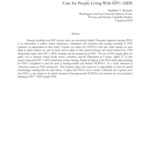More Than a Home: Permanent Supportive Housing is Health Care for People Living With HIV/AIDS

View/
Author
Morcelle, Madeline T.
Subject
Washington and Lee University -- Capstone in Shepherd Program for the Interdisciplinary Study of Poverty and Human Capability
Poverty
Homeless persons -- Health and hygiene
HIV infections -- Treatment
HIV-positive persons -- Services for
Metadata
Show full item recordDescription
Madeline T. Morcelle is a member of the Class of 2015 of Washington and Lee University School of Law. Capstone; [FULL-TEXT FREELY AVAILABLE ONLINE] Housing instability and HIV-positive status are inextricably linked. Permanent supportive housing (PSH) is an intervention to address chronic homelessness. Individuals who transition from housing instability to PSH experience an improvement in their health. Evidence has shown that PLWHA who have stable housing are more likely to obtain medical care and are better able to adhere to their antiviral therapy and related medical care. PSH dramatically reduces both HIV/AIDS mortality and the transmission of HIV. The cost of PSH roughly offsets the public costs to hospitals, mental health services, corrections, and the Department of Veterans Affairs (VA) that tenants living with HIV/AIDS would incur without housing. Despite the efficacy of the PSH model, federal funding for PSH is insufficient to meet the needs of housing-unstable and homeless PLWHA. As a result, thousands of Americans remain on PSH waiting lists. This Article argues that society has a responsibility to correct for special disadvantages resulting from the social lottery. It argues that PSH is such a remedy. Ultimately, this Article avers that PSH is a key element in the holistic treatment of housing-unstable PLWHA and advocates for increased federal funding for HIV/AIDS-specific PSH.